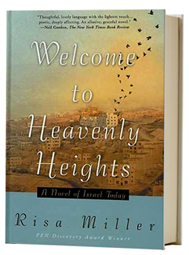




 NEW WORLD'S RHYTHMS
Author(s): Judith Bolton-Fasman Date: May 25, 2003 Page: D9 Section: Books Boston Globe So much of what happens in the world escapes newspaper reports. Fiction can give us the story beyond those events, and memoir conveys them in a personal, deeper context. It becomes clear, however, that even these descriptions are impossibly neat classifications when a genre-defying novel like "Welcome to Heavenly Heights" comes along.
Risa Miller's intricate and finely wrought first novel focuses on the lives of Orthodox Jewish Americans who have made "aliyah" - a Hebrew word that literally means to take flight, but idiomatically means to move to Israel. They now live in a West Bank apartment complex called Heavenly Heights. For the American Jews in Heavenly Heights' Building Number Four, coming to Israel is more like reaching a new state of mind than geographical relocation. "Eretz Yisrael [was] not as much the state of Israel, but the Land of Israel, the biblical promised portion." Given this attitude, a reader might well expect politics to course through much of the book. But Miller instead emphasizes the inner lives of her characters.
To that end, the book belongs to Tova, a dutiful wife and mother who initially lives in Baltimore with her husband, Mike, and three young children. An observant Jew, Tova arranges her life in close alignment to the Jewish calendar. In Baltimore she teaches English to Russian immigrants and muses that in America she "called her students Russians. In Russia they were called Jews. Here, Tova was an American - and she was venturing out to be a Jew."
Shifts in identity are a subtle constant throughout the novel. Once settled in Heavenly Heights, Tova encounters Debra, a convert to Judaism who was raised by her grandmother in the hills of Kentucky. "From the moment of her arrival, Tova found Debra equally repelling and attractive, equally suspect and superior," a tension that is beautifully sustained throughout the narrative. Debra, Tova's stalwart mentor to life in Israel, also stands out as a mystical character. It is appropriate, then, that Tova first bonds with Debra in the latter's "sukkah," a temporary dwelling erected during the weeklong harvest festival of Sukkot. During Sukkot there is the symbolic tradition of inviting "mystical guests," usually venerated ancestors, to grace the sukkah with their wisdom and holiness.
Another part of Debra's distinctiveness is her sweet, magical singing voice, which for the sake of modesty she never purposely allows men to hear. When Tova listens to Debra's voice two floors below her, the musical notes literally materialize in front of her.
Miller's description of this apparition is a playful riff on the mystical notion that the letters of the Torah can rise up from the scroll and stay suspended in meaningful arrangements. She complements the image by showing us the work of a minor character who is a scribe, someone who painstakingly writes every note of the Torah with precision and artistry. Miller transforms the potential drudgery of such detailed work into a spiritual adventure nonpareil.
And so it is for the other residents of Heavenly Heights, who live according to the rhythms and the laws emanating from the Jewish calendar. To emphasize the point, Miller concentrates on events that intersect with relatively minor holidays such as Hanukkah, Tu B'shevat, Purim, and Lag B'omer.
Throughout the narrative, Miller is working with the underpinnings of Judaism, capturing the elusive sparks of holiness and faith that illuminate its legends and celebrations.
Even a political act, like the short excursion from Heavenly Heights to Hebron, becomes more of a philosophical pursuit. Mike questions the relevance of saying the Wayfarers' Prayer before the group of 35 men, women, and children from Heavenly Heights sets out to spend the Sabbath in an outpost near Hebron. After all, the prayer is recited when going from one place to another. "Funny, he'd fathomed the whole trip figuratively and literally as a continuum.
Wasn't that what it was all about?"
Hebron is home to the Tomb of the Patriarchs. The world's most famous biblical couples - Abraham and Sarah, Isaac and Rebecca, Jacob and Leah - are buried there. The Hebrew name for the tomb, "Machpelah," implies a doubling, and that kind of duplication extends beyond the couples to both Muslims and Jews, for whom it is a holy site. At best, the Tomb of the Patriarchs has been a place of tentative coexistence. At the other end of the spectrum, it's been a place of murderous tragedy.
One "midrash," or rabbinic commentary, suggests a utopian image for the tomb by claiming that it was once the entrance to the Garden of Eden. Miller brilliantly evokes the irony and loss implied by that midrash. While in Hebron, Mike notes that you "never saw much of Abraham's inner life. When he was told not to be afraid, well, he was just not afraid." That is the literal text of Genesis, an observation equivalent to newspaper headlines. But Miller mines those headlines - as well as her own experiences of living in Israel - for the kind of exquisite details that layer midrash and fiction on top of everyday events to reach heavenly heights. Click here to return to the reviews on Welcome to Heavenly Heights
|
